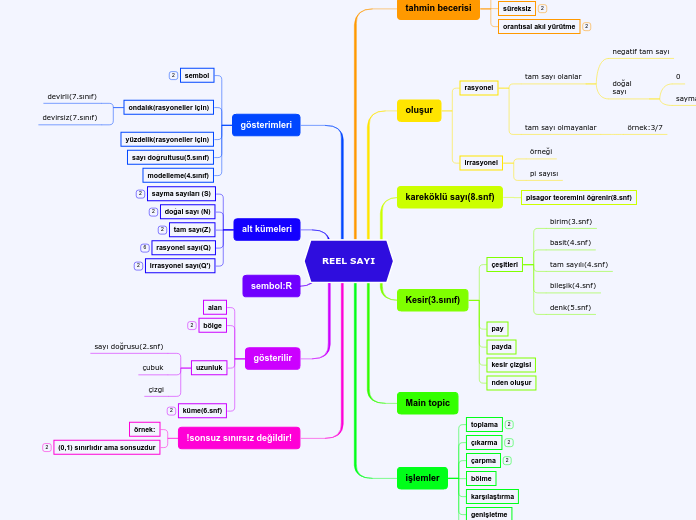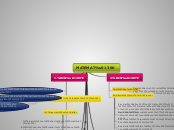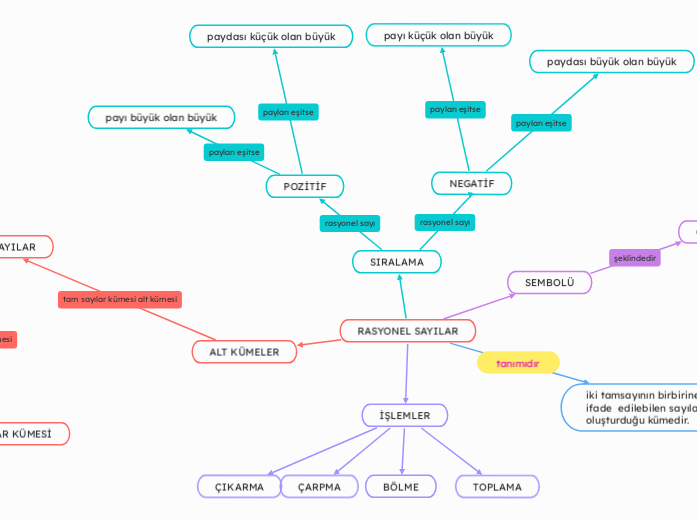REEL SAYI
The part of speech is a category to which a word is assigned according to its syntactic functions. In English the main parts of speech are noun, pronoun, adjective, determiner, verb, adverb, preposition, conjunction, and interjection.
!sonsuz sınırsız değildir!
A conjunction is a word like 'if' 'but' or 'and' which is used to connect sentences or clauses together.
(0,1) sınırlıdır ama sonsuzdur
Coordinating conjunctions always connect phrases, words, and clauses. They are: for, and, nor, but, or, yet, so.
This stew is savory and delicious.
örnek:
gösterilir
A preposition is one of the most exciting parts of grammar. A preposition is used to describe the location of something in relation to something else.
küme(6.snf)
Participle preposition consists of words that end in “ing”.
regarding, barring, concerning, considering, etc.
uzunluk
When a preposition consists of more than one word, it is called double preposition.
çizgi
çubuk
sayı doğrusu(2.snf)
bölge
Compound preposition consists of two or more words.
on behalf of, according to, in front of, from across, etc.
alan
When a preposition consists of one word it is called single or simple preposition.
sembol:R
An interjection is used to express emotion in a sentence.
Think of other interjections!
alt kümeleri
An adverb is used to describe a verb, but it can also describe an adjective or another adverb.
Adverbs normally help paint a fuller picture by describing how something happens.
irrasyonel sayı(Q')
A lot, Little, Much
rasyonel sayı(Q)
The intensifiers strengthen adverbs adjectives and adverbs and down- toners make them weaker.
down-toners
Fairly, Rather
intensifiers
Extremely, Very
tam sayı(Z)
Just, Afterward, Soon, Currently
doğal sayı (N)
Always, usually, Never
sayma sayıları (S)
Carefully, Slowly
gösterimleri
A numeral is a word or phrase that describes a numerical quantity.
Some theories of grammar use the word 'numeral' to refer to cardinal numbers that act as a determiner to specify the quantity of a noun, for example the 'two' in 'two hats'.
modelleme(4.sınıf)
sayı doğrultusu(5.sınıf)
yüzdelik(rasyoneller için)
ondalık(rasyoneller için)
devirsiz(7.sınıf)
devirli(7.sınıf)
sembol
First, second..
işlemler
A pronoun is a word that can be used in place of a noun, typically after the noun itself has already been stated.
sadeleştirme
genişletme
karşılaştırma
bölme
çarpma
Reciprocal pronouns are used for actions or feelings that are reciprocated. The reciprocal pronouns are each other and one another.
Each other, one another
çıkarma
A reflexive pronoun ends with ...self or ...selves and refers to another noun or pronoun in the sentence (usually the subject of the sentence). The reflexive pronouns are myself, yourself, herself, himself, itself, ourselves, yourselves, and themselves.
Itself, Himself
toplama
Demonstrative pronouns are used to demonstrate (or indicate). This, that, these, and those are all demonstrative pronouns.
This, These
Main topic
Kesir(3.sınıf)
An adjective is a word that's used to describe a specific noun and to provide more detail to the listener.
nden oluşur
kesir çizgisi
payda
pay
çeşitleri
denk(5.snf)
bileşik(4.snf)
tam sayılı(4.snf)
basit(4.snf)
birim(3.snf)
kareköklü sayı(8.snf)
pisagor teoremini öğrenir(8.snf)
oluşur
A noun is defined as a person, place, thing or idea. Proper nouns always begin with a capital letter. Common nouns, which are general words, such as 'cars,' are not capitalized.
irrasyonel
Countable nouns are nouns that can be counted, even if the number might be extraordinarily high.
Uncountable nouns are nouns that come in a state or quantity which is impossible to count; liquids are uncountable, as are things which act
like liquids.
pi sayısı
örneği
rasyonel
Proper nouns are the names of specific people or places. They should always begin with a capital letter.
tam sayı olmayanlar
örnek:3/7
tam sayı olanlar
doğal sayı
sayma sayıları
0
negatif tam sayı
tahmin becerisi
A verb is an action word or 'doing' word that signifies movement in some way.
orantısal akıl yürütme
A modal is a type of auxiliary (helping) verb that is used to express: ability, possibility, permission or obligation. The main modal verbs in the English language are: can, could, may, might, must, shall, should, will, would.
I might go to the park if I get my homework done.
süreksiz
A linking verb connects the subject with a word that gives information about the subject, such as a condition or relationship.
You look exhausted after studying all night.
sürekli
A verb with its own meaning: a verb that is not an auxiliary verb.
Create sentences
They have it.







